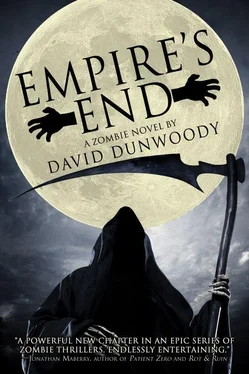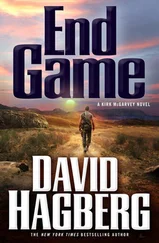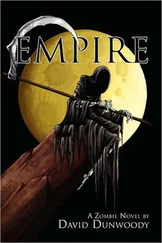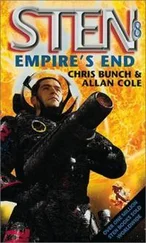Then Grimm had walked in. He looked through the visor of his gas mask at Ryland’s bloody mouth and hand and clothing, Ryland sitting on the floor with a blank stare, like a boy caught playing with himself. Two days later, Grimm was living out in the neighborhood with the afterdead. Ryland had figured no one would believe the story if Grimm told them, but why take any chances?
Most of his body felt dead, somehow, and even though he was now able to eat chum and keep it down, there were still signs of it. If he sat in his chair too long he’d get mottled purple spots all over his buttocks, legs and back. Sometimes at night he’d wake up to discover his bladder had emptied itself. Trying to get out of bed, he found himself paralyzed by what seemed like rigor mortis. And Jesus Christ, he farted all the time, expelling the noxious gases of internal decay. He couldn’t eat nearly enough to stave off such things; he couldn’t risk being caught shoveling chum into his mouth again. St. John was already on his ass for three deaths.
Day by day, Ryland was growing accustomed to the spreading infection, and so was his ego. He decided it wasn’t chance, but that he’d been chosen . He would be the first true afterdead — not some soldier who took shrapnel in Lebanon and had his dead body dumped in that accursed swamp. No, Ryland was willingly giving himself over to the other side. There had only been one more test to pass, and that was Cervantes. The telepath hadn’t sensed Ryland’s condition at all. He was now confident that he was not dying, but evolving .
He longed to go out among the afterdead and see how they reacted, if at all. Would they attack him, or consider him one of their own? He chuckled at the thought. They were senseless animals without purpose. The scientists spent all day and night cutting the dead into pieces, burning them, pulling out their organs. They only sought to define the afterdead, to put it all in books and file it away, then they could sit back and relax knowing that humanity was still top dog. Insecure fools. He alone would know death firsthand, experience it in a conscious way.
Chosen .
He dug into the base’s historical archives — information suppressed from the general public — researching the ways that tribal peoples around Sources had explained the phenomenon. Of course, they had decided that dark gods were responsible. The gods were long gone, perhaps dead, but their leavings endured — including strange words that had probably been made up by the savages but were purported to focus and direct the chaotic Source energy.
He had been studying these words. His extensive education gave him a leg up on the military historians who’d catalogued and promptly forgotten these silly fables. He was beginning to understand the lost tongues of the old gods, and he was beginning to believe that he might be able to do greater things with the plague-energy that coursed through him.
Somewhere beyond death, off this mortal coil, lay godhood.
* * *
It was a long drive to Whittaker’s house. The rental car was running on fumes; Clarke had used Whittaker’s credit card to refuel, but it wasn’t long before he exhausted the remaining credit. Holding the dead man’s ID against the steering wheel, checking addresses as he drove, Clarke finally came to a small frame house with an unkempt yard. The first key he tried opened the front door.
The interior was almost bare. There had been feeble attempts to decorate: a generic print of an elk in the woods hung on the wall. The leather couch had two end tables covered in magazines. Clarke pushed aside the top magazine, a year-old issue of Newsweek . The one below it, and all the ones below that, were porn.
As expected, Whittaker had an impressive gun collection in the bedroom. Some of them were modified arms from the base, illegal to have in the home. Clarke opened the glass doors of the gun case and began pulling weapons out, setting them on the bed for further scrutiny. Opening the closet, he kicked aside a few pairs of jeans lying on the floor and found Whittaker’s Army fatigues neatly folded. Knowing Whittaker’s fondness for his days in combat, he wasn’t surprised to see the uniform in pristine condition. It would be a bit loose on Clarke’s frame but that didn’t matter. He pulled it on over his soiled clothes.
There was a pickup truck in the garage, and for that Clarke also had a key. He pulled out with a satchel of weapons beside him in the passenger seat. A memory was stirred in the recesses of his mind… nearly a decade before, when he’d been a young officer and had just been brought onto the afterdead project.
The first corpse that the government had resurrected was an unpleasant character named Louis Brownlee. In life he had been locked away in a federal prison for fatally shooting two DEA agents during a bust. Small-time hood made notorious by capping a couple of undercover agents. A chain smoker, cancer had claimed him early during his double-life sentence. Brownlee’s body had quietly been shipped to the Louisiana base and seeded in the swamp. The URC infused his tissue, and a group of soldiers watched in horror as he rose from the muck and fixed yellow eyes on their warm living flesh.
The military were eager to explore the possible applications of the undead. Could Brownlee be made to obey the living? Could he fight? Could he infect? Clarke sat in smoky rooms, with celebrated generals and Defense Department officials yelling at each other, as the afterdead began to appear less and less useful. Finally, Brownlee was placed under restraints and brought into one of the meetings. The officials stared blankly at him. He returned the look. A colonel named Richard St. John took a long drag off his cigarette and met the creature’s gaze without fear. Brownlee’s withered lips opened and closed, a weak sound emanating from his throat. “What is it saying? What does it want?” A man asked. Standing up, St. John approached Brownlee. “His file said he was a smoker.” And he placed his cigarette in the zombie’s mouth.
The stiff, pained stature of the afterdead relaxed. Brownlee leaned his head back and exhaled. He was still addicted.
Not long after that, Clarke and a small team were flown to a facility in Puerto Rico, Brownlee brought along in chains. The secret prison there housed a few terrorism suspects, and these prisoners were strong. They didn’t talk under burning lights, they didn’t weep in the face of brutal torture or even sexual humiliation. A religious fervor possessed them and made them more than men, at least in their own minds.
Clarke wheeled Brownlee into an interrogation room on a dolly. An Arab, sitting in a lone chair, narrowed his eyes.
The CIA interrogator was leaning against the rear wall. He spoke in English. “Salim, this gentleman is here to make sure you answer my questions.” Clarke released the straps holding Brownlee down, and the afterdead stepped into the middle of the room. Clarke stood away from him and held up a carton of cigarettes. “Play nice, Brownlee.”
The next hour was a nightmare. Clarke fought to stand still and watch, his knees knocking. Even the interrogator was shaken by the end of it; he could barely issue the order for Brownlee to finally kill Salim. Together they rushed from the room and let the zombie feed in peace. And on closed-circuit monitors in another room, the remaining prisoners watched in terror. They were much more compliant after that.
Brownlee’s addiction to nicotine seemed to be the only leverage that his handlers had. After devouring a captor, he would sit on the floor in a pool of gore and light cig after cig, staining them red with his fingers and lips. He allowed himself to be chained and flown around the world, always with Clarke holding a fresh carton before him. Over time, they noticed that he seemed to become healthier if he ate frequently. His eyes almost began to look human again. Unnerved, they cut back his food supply.
Читать дальше












